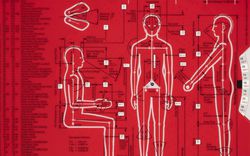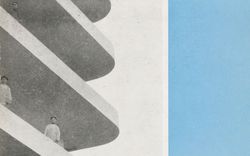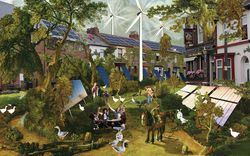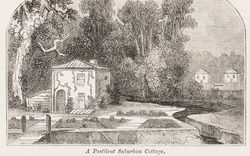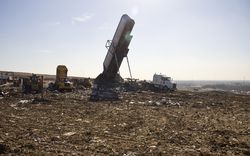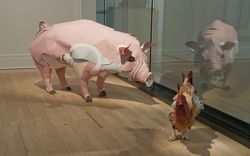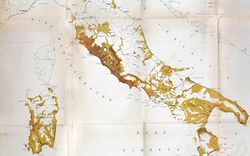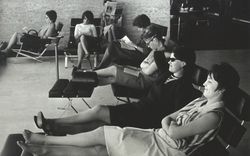Our health-obsessed society, however, offers diverse interpretations of health. For example, the idea of health is no longer identified primarily with the absence of illness, but has expanded to include a state of general well-being concerning all types of functioning, from physical and biological to social and cultural. Nevertheless, the ambition for total well-being is fragmented and parcelled out in a series of policies and disconnected actions. The means to overcome old and new illnesses, the production of a new, healthier body to withstand (inevitable) deterioration, is today achieved through voluntary biomedical technology and individual efforts (“staying in shape”), supported by new environmental urban planning policies.
The distinction between a sick body and a sound body has also grown. Being in good health today seems to imply youth and athleticism. A healthy body is part of a new aesthetic and erotic ideal, the product of concurrent medical trends, health policies, and individual choices, as medical historian Dorothy Porter has observed. We are far from the welfare-state health policies that were developed during the postwar era to promote preventive medicine and establish good health as a social right of every citizen, in keeping with studies by British sociologist Thomas Humphrey Marshall from the 1950s. Higher health care costs, reduced public services and spending, and the affirmation of an individualist rhetoric mean that today, health is increasingly considered an individual responsibility.
Contemporary architecture and urban planning seem to address, uncritically, the conditions and context in which this discourse on health is developing. In most cases, design disciplines prefer to rely on an abstracted, scientific notion of health, and very literally adopt concepts such as “population,” “community,” “citizen,” “nature,” “green,” “development,” “city,” and “body” into a professionalized, disciplinary discourse that simply echoes the ambiguities characteristic of current debate. Contemporary practitioners also prefer to ignore the fact that economic processes are closely intertwined with environmental processes and especially that concepts of the body, health, and sickness are products of history, politics, economics, and culture. To attempt to properly “diagnose” related problems of urbanism, we must not speak of health in abstract terms, but rather of various ideas and states of health. As Jonathan M. Metzl has noted, “‘Health’ is a term replete with value judgments, hierarchies and blind assumptions that speak as much about power and privilege as they do about well-being. Health is a desired state, but it is also a prescribed state and an ideological position.”
The Imperfect Health project does not represent a comprehensive survey of the relationships between health, architecture, cities, and the environment. On the contrary, it draws on projects and texts meant to highlight some of the uncertainties and contradictions present in ideas of health and health care that are emerging in Western countries today, particularly in Europe and North America.
Some projects still adhere to the modernist vision of architecture and urban planning as rational processes that provide possible treatments for old and new illnesses, and are even capable of producing new bodies. But other failed experiments of the twentieth century provide enough evidence to suggest that architecture, urban planning, and landscape architecture should also exercise caution, giving more attentive consideration to possible effects and outcomes. The unexpected (often unhealthy) consequences of what had been celebrated as progress—the triumphs of industrial production—are increasingly evident. It is not only a question of damage done to the environment by polluting land, air, and sea. An absolute confidence in the ability to provide perfect solutions can easily give way to its polar opposite: doubt, and the consequent emotions of anxiety and fear. In the particular case of asbestos, for example, what was once regarded an ideal material for every imaginable application is today pronounced highly carcinogenic. Paradoxically, Imperfect Health tells of an unavoidable process of defeat: the inability of architecture to offer an optimal or permanent fix based on its promise of rational parameters.
Machiavelli long ago observed, “In the order of things it is found that one never seeks to avoid one inconvenience without running into another; but prudence consists in knowing how to recognize the qualities of inconveniences, and in picking the less bad as good.” Given these complex conditions of engagement, it is critical that the relationship between architecture and health be revised. While perhaps partly responsible, architecture is not always capable of providing positive solutions for the environment or the “sick” body. Instead, a confused and anxious contemporary architecture struggles to produce new manifestations that avoid exalting the spectacle of capital of the last twenty years. While architecture is looking once again into the ambiguous political, cultural, moral, and, above all, social ideas of health and medicalization for both justification and a new mandate, it should seek to challenge—rather than pacify—the newly emerging neo-liberal agenda and question a medicalized vision and approach toward health issues.
